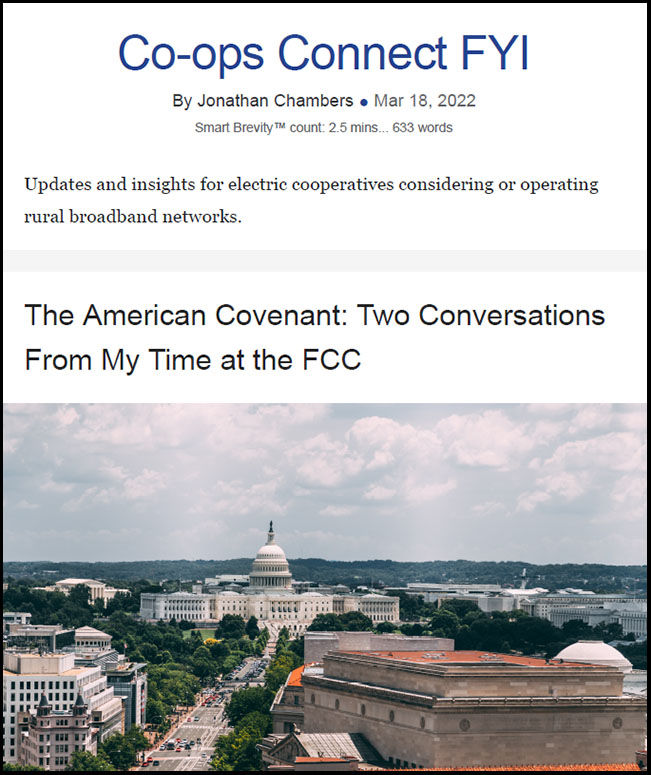The American Covenant: Two Conversations From My Time at the FCC
March 17, 2022
Congratulations to Trent Harkrader, recently named the FCC Chief of the Wireline Competition Bureau, a position that has historically been the second most influential telecommunications job in the government.
When I worked at the Commission, I had a habit of wandering the halls and dropping in on colleagues. One winter day, I dropped in on Trent and said, “You know that a half million of our fellow citizens are going to sleep on the streets tonight.”
His response: “So, what’s your solution, Chambers, broadband?”
At the time, we were working on a reform of the e-rate program, which makes broadband funding available to schools and libraries. I have a soft spot for public libraries.
The Martin Luther King, Jr. Library is located in downtown Washington.
If you go past that library at a certain hour in the morning, before the library opens, you’ll see a line out front, people waiting to use computers for internet access. Just before the library closes, you’ll see buses out front, taking many of those same people to homeless shelters.
Over the past weekend, there were photos in the Washington Post of a gunman shooting homeless people while they slept on the sidewalks of Washington. Horrific. He was caught this week. I can’t get the image out of my mind.
Why it matters:
America is built on a covenant, a covenant of “We, the People.” The people are all of us together. In fact, in Hebrew, the United States is Artzot Ha-brit, which translates to “The Lands of the Covenant.”
The covenant of America has bypassed too many, overlooked too many, allowed too many to come up short.
The bottom line:
I don’t have a solution to homelessness, the war in Ukraine, or the toxic nature of our politics.
I do know how to solve the digital divide.
The Story of East Carroll Parish
I once said to the Chairman of the FCC, while arguing against the Connect America Fund scheme:
“Which would be better, providing funds to community institutions like electric cooperatives to build fiber broadband or to AT&T for DSL and fixed LTE?”
His response: “Capitol Hill likes corporate welfare. We’re going to give the money to AT&T.”
Why it matters:
In East Carroll Parish, Louisiana, AT&T received several million dollars (from the date of that remark to today) to deliver 10 Mbps downstream/1 Mbps upstream.
As one resident of East Carroll wrote about their broadband options:
“Are we paying for steak, but only getting baloney?”
- East Carroll Parish, as measured by household income, is the poorest parish in Louisiana. Louisiana, by the same measure, is the second poorest state in the nation.
- Together with East Carroll, we have applied for a GUMBO grant. The GUMBO (Granting Underserved Municipalities Broadband Opportunity) program is about to issue its first round of broadband funding.
- We are seeking about the same amount of money AT&T has received in the parish. Entergy is the electric utility in the area, so we are not working with a co-op.
The bottom line:
- If we are awarded a grant, we will build a fiber network to every home and business in the parish.
- Since most every household in the parish qualifies for the Affordable Connectivity Program, we will work with community institutions to help eligible households participate.
- With that discount, we will offer 100 Mbps/100 Mbps for $19.95, 1 Gbps/1 Gbps for $49.95, and 2 Gbps/2 Gbps for $69.95.
- We will do so this year.
East Carroll has waited long enough.
Steak, not baloney.
